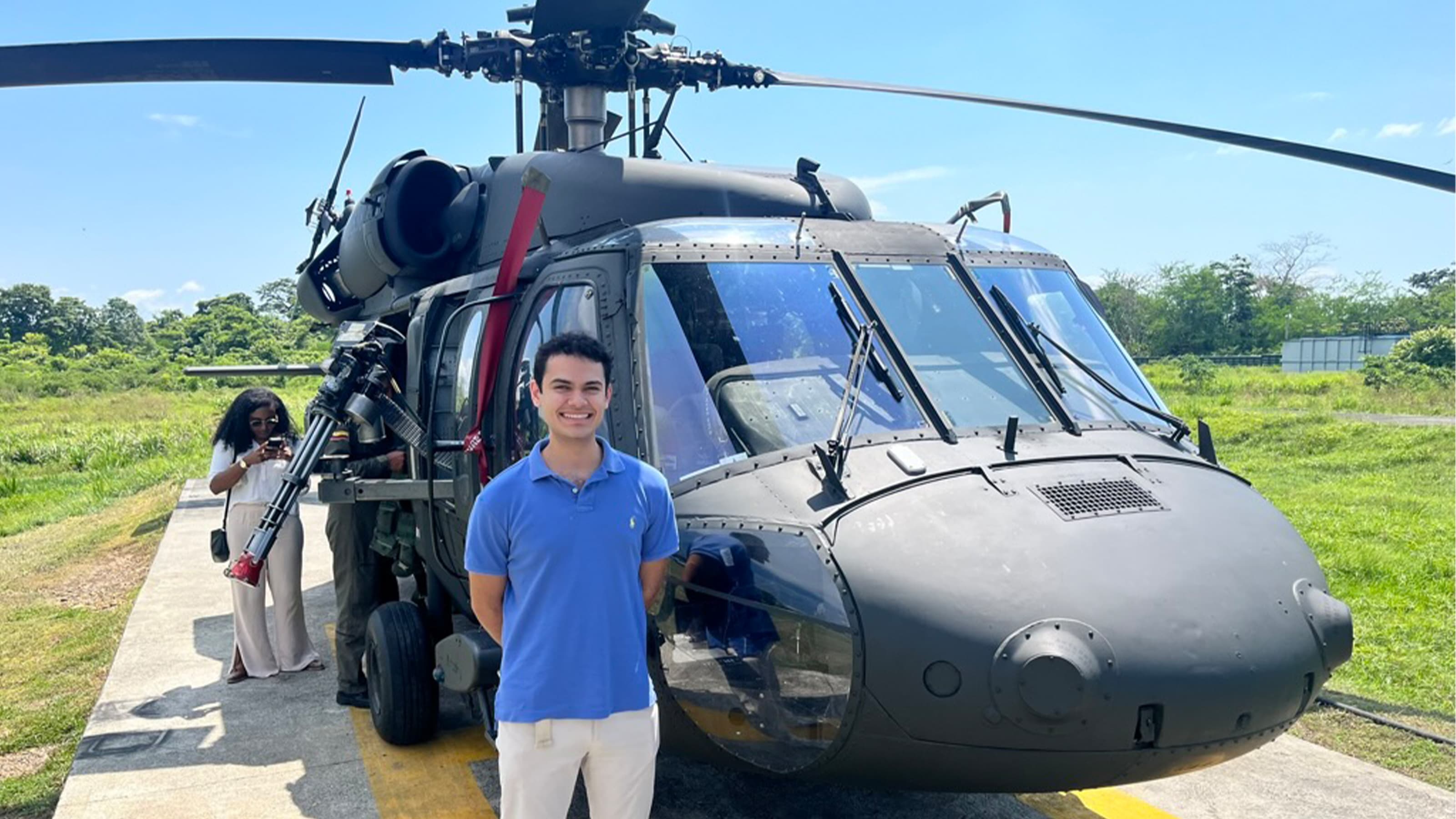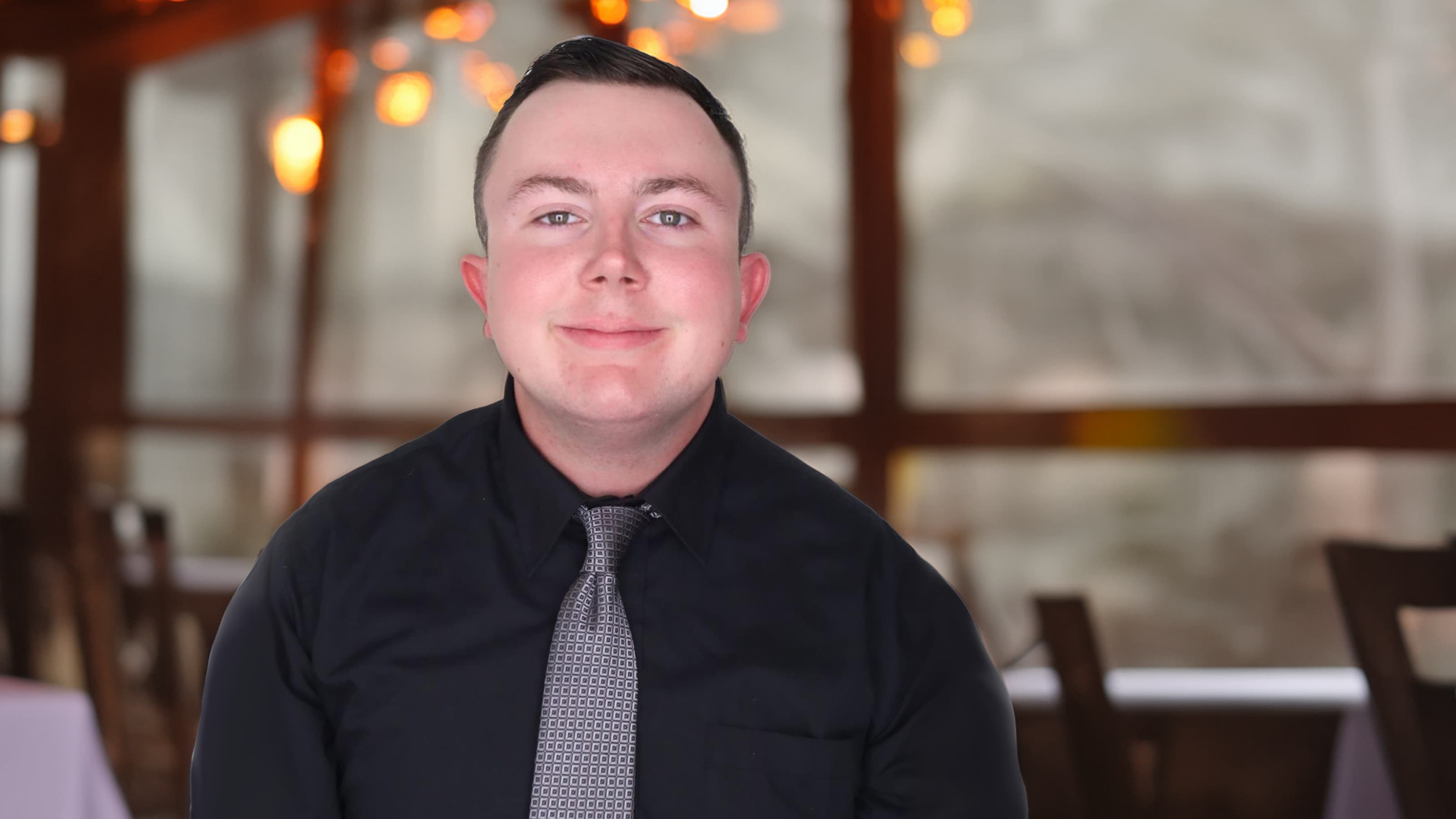How Students Made the Most of their Internships and Co-ops During COVID-19
Despite the uncertainty around the state of internships and co-ops, students at Saint Joseph’s have gained meaningful industry experience that will prepare them for the future. We spoke with three students to see how the pandemic affected their experiences, the challenges they faced and what they learned from it.
 Alysa Bainbridge '21 on set at 69 News (WFMZ-TV) during her internship last fall.
Alysa Bainbridge '21 on set at 69 News (WFMZ-TV) during her internship last fall.
- With the onset of the pandemic, the corporate world had to embrace digital transformation and quickly pivot to remote work.
- It wasn’t just employees who were affected by the transition; college students also had to deal with the changes and uncertainty around their internship and co-op opportunities.
- Three Saint Joseph’s University students share their experiences of completing an internship or co-op during the pandemic and the lessons they learned.
When the coronavirus pandemic hit last March, companies and organizations across all industries had to embrace digital transformation and determine how to overcome the challenges of managing virtual teams. Meanwhile, those deemed essential or who started the return to in-person work had to follow new guidelines to reduce the spread of the virus.
But it wasn’t just employees who had to adjust to a new working environment; college student interns and workers did too. For Saint Joseph’s students, interning or participating in a co-op program during a pandemic was a pivotal moment and a lesson in resilience.
We spoke with three students about the pandemic’s impact on their experiences, the challenges they conquered and the lessons they learned. Although their original plans changed, they stayed flexible and seized opportunities available to them. They gained meaningful industry experience and valuable skills — from better time management strategies to effective online communication — that will prepare them for the future.
Reporting in a Pandemic as a News Intern
In the spring semester of 2020, Alysa Bainbridge ’21 landed her dream internship: working for Fox 29 (WTFX-TV).
Bainbridge, a communication studies major and journalism minor at Saint Joseph’s, grew up watching the station’s morning show, Good Day Philadelphia. So when she found out she was accepted into their internship program, she was ecstatic — even if it meant getting to the studio at three or four in the morning.
“I was getting mentored by and connecting with the people I grew up watching and considered my broadcast journalism idols,” Bainbridge says.
Then, the pandemic came, pushing Fox 29 to send their interns home. Although Bainbridge was able to continue her internship virtually, researching and logging news shows from her off-campus apartment, she says she missed out on the in-person aspect of the job.
Luckily, she got another chance. After attempting to find another news internship in the fall, Bainbridge heard back from her friend, reporter Holly Harrar of Allentown’s 69 News (WFMZ-TV), about an opportunity to be her personal intern.
I think I learned more and was put into more situations that will prepare me for my career compared to a regular news cycle.”
Alysa Bainbridge ’21
Communications MajorCome September, Bainbridge was out in the field twice a week, helping Harrar report important stories.
“I’ve seen just about everything in my few months of being a field reporter with her,” Bainbridge says. “I got a chance to do some on-camera work, build a demo reel and create stories of my own. She would also let me do interviews, so I got to interview prominent figures in Allentown, from their police chief to their mayor.”
To reduce their risk of COVID-19 while working on assignments, Bainbridge and her team made sure to take all the necessary precautions.
“We wore masks, and for the most part, I drove myself to most of our stories just so I had less contact with the people I worked with in an enclosed space like our van,” she says.
Bainbridge says despite the challenges of reporting during a pandemic, she was grateful for the experience. “I think I learned more and was put into more situations that will prepare me for my career compared to a regular news cycle,” Bainbridge says.
She’s also glad that she stayed persistent and patient while she was looking for an internship and advises other students to do the same.
“At this point, it’s going to take more than looking on job platforms and seeing if there’s anything open on there,” she says. “Find the email addresses of the people in charge and reach out to them. Use your connections and don’t be afraid to track people down and ask them for opportunities. There will be something for you, even if it’s not in the form of a formal internship.”
Preparing for the Future of Work with a Virtual Co-op
When Fernando Cordova ’23 found out that his first co-op semester last fall would be completely online, he knew it was going to be an adjustment.
Cordova, a finance major who worked at the drug wholesale company AmerisourceBergen as a pricing analyst, was worried that he wouldn’t get the in-person workplace experience he was hoping to have.
“That was one of my goals for doing a co-op — to see what it’s like being around co-workers, to learn how to communicate and interact with them,” he says.
But Cordova didn’t let that worry dictate his co-op experience. Although his work — doing price comparisons and adjustments, contract pricing and data analysis using software and databases — was not team-based in nature, he found ways to connect with other people on his team.
He saw their weekly Friday team check-ins as an opportunity to get to know his colleagues outside of the work they did. Cordova also scheduled virtual meetings with people from other departments to learn more about their areas and responsibilities, expanding his knowledge of the scope of AmerisourceBergen’s work.
“I’m glad I was still able to build relationships with my co-workers and my supervisors,” he says. “I still got a taste of the workplace before actually going into it, which is something that I think is really crucial to have before you graduate.”
Having a virtual co-op also prepared him for the future of work, Cordova explains. “Given this technological world we’re living in now, I think that a lot of jobs will be done remotely moving forward,” he says. “This experience taught me what that could be like and how to best manage it.”
Cordova says students who might need to complete an internship or work experience virtually are in a good place to gain valuable skills. “You’ll really learn how to adapt, which is important because remote work will be our new reality,” he says. “I can see how most companies might embrace it more to avoid future costs. So, try to get the most out of it and learn as much as you can, even if the situation is hard.”
Given this technological world we’re living in now, I think that a lot of jobs will be done remotely moving forward. This experience taught me what that could be like and how to best manage it.”
Fernando Cordova ’23
Finance MajorOvercoming Networking and Time Management Challenges During Remote Work
Samantha Kovacs ’23 was looking forward to working for Johnson & Johnson in Skillman, New Jersey, in the summer of 2020.
But because of the pandemic, the company decided to move its co-op program online. Kovacs, who was in the North America Deliver Finance co-op program, received her work laptop in the mail and officially became part of the company’s first fully virtual co-op.
The accounting and finance major says she was lucky that the work she did, such as fixing data entry codes and working on month-end closing reports, translated well to remote work. But her experience wasn’t without challenges.
“One of the hardest things I faced was not being able to be with my co-workers and get in-person training from them on the reports that I would handle,” Kovacs says. “But it’s almost like a blessing in disguise because it made me work harder to understand what those reports were about.”
Networking was also more difficult to do online. “J&J is big on networking, but I wasn’t able to stop by the kitchen in the office to talk to someone or run out to lunch with somebody,” she says.
Similar to Cordova, Kovacs used her team’s weekly meetings as a way to stay connected to her co-workers. She was also active in J&J’s Intern Co-op Association (ICA), which held biweekly meetings and networking sessions, allowing her to meet people from other co-ops and learn about other positions within the company. “It was actually a huge benefit because if we were in the office, we wouldn’t really have the opportunity to meet people from co-ops in the Titusville or Piscataway locations.”
Kovacs also says she had to learn how to balance her work and personal life. Since her work laptop was always with her while she was at home, it was harder for to stop working through her lunch break or past 5 p.m., when her workday ends. She says it’s even more difficult now as she’s continuing her work with J&J part-time while taking five classes.
“Since I have to do both the co-op and school now, I really had to learn better time management and use certain tactics to separate different areas of my life,” she says. “I have scheduled work hours and school hours, which my team is aware of. I also never take my work laptop into my bedroom so I have that feeling of being separated from my work.”
Kovacs adds that she’s thankful for Todd Krug, Ph.D., the director of the Cooperative Education Program for the Haub School of Business, and his support during her co-op experience.
“When we found out that we would all be virtual, he reached out to us to make sure we were OK and cheered us on,” she says. “It was great to have that, especially in the fall because I wasn’t taking classes. It was really nice to still have that connection to St. Joe’s.”



